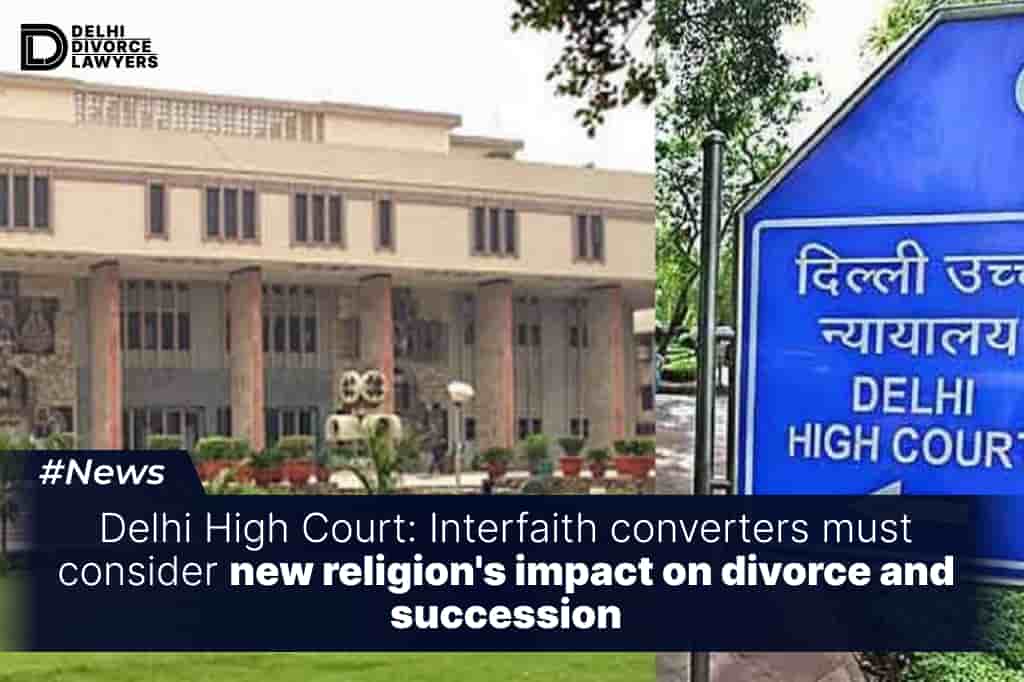The Court said that the person who is converting to another faith must be explained the tenets, rituals, and expectations inherent in religious conversion.
On Friday, the Delhi High Court mandated that individuals changing their religion for marriage with someone from another faith must submit an affidavit acknowledging their awareness of the consequences of the new religion, particularly regarding divorce, custody, succession, and religious rights (Maksood Ahmad v State of NCT of Delhi & Anr). The Court issued comprehensive guidelines for authorities handling post-conversion interfaith marriages and recording statements of sexual assault victims under Section 164 of the Criminal Procedure Code (CrPC).
According to the ruling, the conversion certificate should be accompanied by a certificate affirming that the convert has been briefed on the tenets, rituals, and expectations associated with religious conversion. This includes an understanding of the implications and consequences related to marital divorce, succession, custody, and religious rights. Additionally, the Court stipulated that the conversion and marriage certificates should be provided in an additional vernacular language, ensuring comprehension by the prospective convert and serving as evidence of their understanding.
“The same be in Hindi also where the language spoken and understood by the prospective convert is Hindi, in addition to any other language preferred to be used by such authority. Where the language spoken and understood by the prospective convert is other than Hindi, the said language can be used,” the Court said.
The importance of submitting a comprehensive affidavit with details such as age, marital history, and current marital status, supported by evidence, was reiterated. The affidavit must expressly declare that the conversion is a voluntary decision, made with a complete understanding of the associated implications and consequences, including those related to marital divorce, succession, custody, and religious rights. Justice Swarana Kanta Sharma clarified that these instructions do not apply to individuals returning to their original religion, as they are already acquainted with their original faith. Additionally, the Court specified that these guidelines are not applicable to marriages conducted under the Special Marriage Act, 1954.
“These guidelines are for ensuring well-informed decision on the part of the naive, uneducated, susceptible, adolescent couples who may enter into such unions after conversions, without fully comprehending the profound implications of such a conversion, impact of which extends far beyond the immediate union, encompassing a myriad of consequences on their personal laws and various facets of life,” the Court said.
Concise Recording Guidelines for Section 164 CrPC Statements:
- Statements should be individually tailored, avoiding a mechanical or typed format and expressed in the victim’s language.
- Victims are promptly presented to the magistrate, with the Investigating Officer (IO) identifying them before the recording process.
- Preliminary inquiries by the magistrate assess the victim’s competence using age-appropriate and educationally relevant questions.
- Questions delve into the victim’s state of mind, addressing awareness, purpose, and reasons for making the statement.
- Inquiries confirm voluntariness, ensuring the statement is free from threats, pressure, fear, influence, coercion, or tutoring.
- For child victims, the magistrate ensures understanding of the oath’s sanctity and may waive it for tender age.
- Preliminary inquiries and statements are conducted in the vernacular and not in a typed, stereotyped form.
- Victim statements are transcribed verbatim, describing the act without euphemisms to prevent trial contention.
- The magistrate appends a certificate affirming the voluntary nature, accuracy, and absence of additions or omissions in the statement.
- The certificate notes that the statement was read and explained to the victim, who signed or provided a thumb impression in the magistrate’s presence.
- If typed by a stenographer or interpreter (an exception), it is specified that it was done at the magistrate’s dictation, representing the true content.
The Court issued these guidelines while rejecting a plea to quash an FIR against a man under Sections 376 (rape) and 506 (criminal intimidation) of the Indian Penal Code (IPC) despite the complainant and the accused marrying. The woman claimed rape by Maksood Ahmad on September 24, 2022, and the FIR was filed on October 18, 2022. Although the woman converted and married Ahmad on the same day, he was arrested on November 18, 2022. Despite her assertion of divorce from her first husband during marriage to Ahmad, the Court found no evidence, as Ahmad was already married. Despite the couple’s desire to quash the FIR due to their marital status, the Court emphasized that subsequent marriage does not automatically warrant FIR quashing in cases under Section 376 of IPC.
“This Court also looks such marriage with suspicion, and the bona fides of accused are also unclear, since the marriage in this case was immediately solemnized i.e. within a period of ten days of registration of FIR, after getting the religion of prosecutrix converted to Islam, and it cannot be ascertained at this stage as to whether the religious conversion in this case was with a bona fide intent to only marry the prosecutrix or to clandestinely project to the prosecutrix that now she was married to the accused and that both of them could now approach the Courts for seeking bail and for quashing of the FIR.”
Justice Sharma concluded that dismissing the proceedings would effectively permit the abuse of the legal process by both parties.
“Thus, in view of the above facts and circumstances, this Court does not find it a fit case to quash the FIR,” the Court held.

